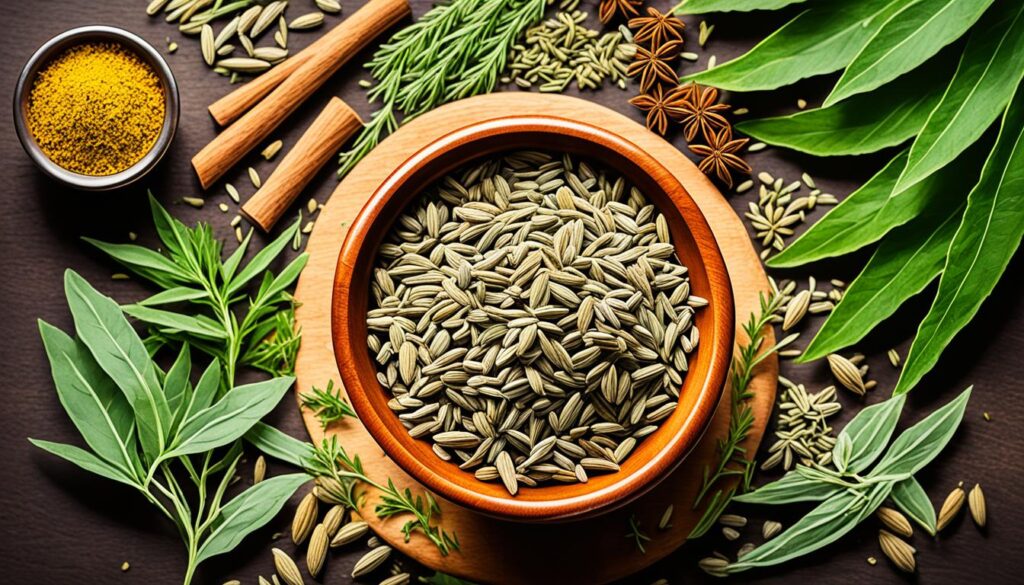Acid reflux is when stomach acids move backward into the food pipe. This action causes chest irritation and burning, known as acidity. Hyperacidity means your stomach makes too much acid. It can show up with heartburn, sour belches, nausea, and more.
Many natural fixes can help with acidity. They aim at soothing your stomach. We’ll look at some easy home remedies. They can help with hyperacidity and keep your stomach happy.
What is Hyperacidity?
Hyperacidity is a stomach issue known as acid dyspepsia. It happens when your stomach makes too much acid. This causes uncomfortable symptoms.
Causes of Hyperacidity
Hyperacidity can come from several things. Bad eating habits like eating irregularly or late, and foods that are spicy, fried, or junk can cause it. So can stress, drinking too much caffeine, not being active, and lying down right after a meal. Smoking, too much alcohol, and some medicines can lead to hyperacidity. Conditions like being pregnant, overweight, getting older, or not eating for a while can also make it worse.
Symptoms of Hyperacidity
If you have hyperacidity, you might feel heartburn or sourness in your throat. You might also feel like you need to throw up, have a sore throat, or feel full even though you haven’t eaten much.
Some people may have chest pain, feel gassy, eat less, or feel tired. These problems can be light or heavy and they might get worse without treatment.
Prevention Tips for Hyperacidity
Stopping hyperacidity is key to a good stomach. Easy food changes and lifestyle tweaks can help a lot. Let’s find out how to keep your tummy and acid happy.
Dietary Changes
What you eat is important. Cut out spicy, fried, and acidic foods. They make too much stomach acid. Try not to drink too much coffee, tea, and soda. They can make acid reflux worse. Always think about how much you eat. Small meals several times a day are better for your stomach.
Lifestyle Modifications
Good habits also prevent hyperacidity. Sleep well and enough to keep acid levels balanced. Moving around with yoga or light workouts helps your digestion. It lowers acid reflux risk. But stress is a stomach trouble starter. So, relax with meditation, deep breaths, or things you like.
Keeping hyperacidity at bay is about balanced living. Making simple changes can help a lot. Be mindful of what you eat and how you live. Your gut will thank you, and you’ll feel better.

Natural Remedies for Hyperacidity
Feeling uncomfortable from hyperacidity? You’re not alone, but there’s good news. Many natural remedies can ease the symptoms of acid reflux. These remedies are safe and can soothe your stomach without pills.
Baking soda is a simple fix. Just add half a teaspoon to a glass of water. Ginger works too, calming stomachs because of its anti-inflammatory nature.
Aloe vera juice is known for its calming effect on the stomach. Surprisingly, drinking apple cider vinegar can help balance your stomach’s pH. And don’t forget about ripe bananas. They can soothe your stomach too.
Probiotics are good for keeping stomach acid in check. You can find them in fermented foods or supplements. Fennel seeds and chamomile tea work well to calm your belly too.
To feel better, try a mix of these remedies each day. But, if your pain doesn’t go away, talk to a doctor. They might have more advice for you.
Tulsi Leaves: A Natural Acid Neutralizer
Feeling a lot of heartburn lately? Tulsi leaves could help. They are actually holy basil. These leaves have stuff in them that calms your belly. It lowers the acid and boosts your belly’s good lining. So, the hurt from heartburn goes away fast.
Try eating 2-3 fresh tulsi leaves often. It’s a great trick. These leaves stop too much acid in your belly. Also, they make your throat feel better. This is if you get that hot, burny feeling from heartburn. And, they can fix a sore stomach too.
- Tulsi leaves have lots of good stuff in them. This helps make less stomach acid.
- Eating a few tulsi leaves at once can make you feel better right away.
- They can also fix a yucky stomach or belly sores.
How about trying tulsi leaves every day? It’s easy and works great. Put them in tea or food. Or just eat them as is. Tulsi leaves are a secret weapon for stopping heartburn and bellyaches.

Ginger: An Anti-Inflammatory Aid
Ginger is known for its many uses, including fighting acid reflux. This spice helps a lot because it has strong anti-inflammatory powers. These can calm down irritation and lower inflammation from too much acid.
How to Make Ginger Tea
Drinking ginger tea is an easy way to enjoy ginger regularly. Here’s how you can brew a cup:
- Start by grating about 2 small pieces of fresh ginger root, yielding approximately 2 tablespoons of grated ginger.
- Bring 2 cups of water to a boil in a saucepan.
- Add the grated ginger to the boiling water and let it simmer for 5-7 minutes. This lets the ginger’s healing powers mix into the water.
- Strain the tea to remove the ginger bits. Then, you can add a bit of honey or lemon for a great taste.
- Drink your ginger tea while warm, especially after meals to help ease any acid reflux pain.
Ginger helps in many ways. It can stop the extra stomach acid from moving into your throat. It also helps your body make more mucus and digest food better. Enjoying a cup of ginger tea often can make a real difference for people with acid reflux.
Cold Milk: A Soothing Calcium-Rich Solution
Dealing with acid reflux or acidity is tough. But, there’s a simple fix in your fridge – cold milk. It’s a well-known remedy to calm your stomach and ease that burning feeling from hyperacidity.
The magic is in the calcium in milk. Calcium stops extra stomach acids from hurting your esophagus. Cold milk stops heartburn and other acid issues almost right away.
Need help with acid? Drink cold milk. The colder the milk, the better it helps your stomach. Drink slowly. Let the milk make a soothing layer in your throat and esophagus. Your pain will lessen soon.
Next time acid strikes, choose a glass of cold milk. It’s easy, natural, and works well to make you feel better. So, enjoy and settle your stomach with this simple cold drink.

Mint Leaves: A Cooling Carminative
Mint leaves help with acid reflux and calm an upset stomach. They have carminative properties, meaning they can reduce stomach acid. Mint leaves cool the stomach lining too.
Drinking mint tea or a mix with ginger soothes the stomach. This mix helps with bloating, gas, and the burn in your chest. It works because mint calms and ginger fights inflammation.
Mint and Ginger Tea Recipe
To make this healing tea, do these steps:
- Bring 2 cups of water to a boil.
- Then, add 9-11 mint leaves and 2 ginger pieces.
- Let it simmer for 5-7 minutes for the flavors to mix.
- Strain it and pour in a mug.
- Finally, stir in honey for sweetness and stomach soothing.
Enjoy this tea for acid reflux or an upset stomach. The mint and ginger mix treats you naturally. It helps calm your stomach problems.
Cumin Seeds (Jeera): An Ayurvedic Digestive Tonic
If you need something to calm your stomach and fight acidity the natural way, cumin seeds (called jeera) might just do the trick. Ayurvedic medicine has praised cumin seeds for their great digestive help. Now, science shows even more benefits for those who struggle with too much acid.
Cumin seeds are great at reducing acid, bloating, and gas. They make your mouth produce more saliva, which helps digestion. Also, they have things that can heal ulcers and make your tummy feel better.
Cumin’s Digestive Benefits
Cumin has thymol, which boosts the making of digestive stuff like enzymes, saliva, and bile. This makes food break down better. It also lowers the chances of acid coming back up and other tummy troubles.
Research also says cumin fights swelling, which can really help if you have bad acid or stomach problems. By calming the belly and throat swelling, cumin brings relief.
How to Use Cumin for Acid Reflux and Acidity
You can use cumin seeds in many ways to beat too much acidity:
- Cumin water: Put 1-2 teaspoons of cumin seeds in hot water and let it sit for 5-10 minutes. Then strain and drink slowly during the day.
- Cumin milk: Boil 1 teaspoon of cumin seeds in a cup of milk. Have it before bed to help your tummy relax.
- Cumin powder: Put a bit of cumin powder in your food or mix it with honey for a fast fix.
Start with a little bit just to be safe, even though cumin is usually fine for everyone. Check with a doctor first if you’re not sure or if you’re taking medicine that cumin might affect.

Adding cumin seeds to your daily habits can naturally help acid problems and keep your digestion in good shape. Try this ancient Ayurvedic cure to feel its soothing effects yourself!
Home remedy for hyperacidity
Some easy home remedies can help with hyperacidity. Things like apple cider vinegar, fennel seeds, baking soda, and licorice work well. They help handle extra stomach acid and make you feel better.
Apple cider vinegar may balance stomach acids. Fennel seeds can make you feel less pain. Baking soda quickly fights extra acid. And licorice root soothes your stomach.
Natural Remedies for Hyperacidity
- Apple Cider Vinegar: It balances stomach acid levels, easing hyperacidity symptoms.
- Fennel Seeds: They have a calming effect, helping with hyperacidity discomfort.
- Baking Soda: A simple remedy, it quickly lowers stomach acid for relief.
- Licorice Root: Its soothing nature helps the stomach, reducing hyperacidity.
Using these natural methods can be a good way to manage hyperacidity. Always talk to a doctor if your symptoms don’t go away or get worse.
Apple Cider Vinegar: A Natural Acid Regulator
Got acid reflux or heartburn a lot? Try apple cider vinegar. It has good stuff like proteins, enzymes, and pectin. These make it a great addition to what you eat.
Some think having too little stomach acid causes acid reflux. Adding some vinegar might balance things. But, scientists need to study more to know for sure.
- Inadequate stomach acid can lead to acid reflux, heartburn, malnutrition, and skin problems.
- Low stomach acid can be due to stress, bad diet, too much sugar, lack of zinc, getting older, taking antacids, food allergies, and ongoing health issues.
- Feeling full of gas, getting bloated, having cramps or heartburn, backing up, going too much, or not enough are signs of low stomach acid.
- To make more stomach acid, eat slowly, avoid processed foods, eat pickled veggies, try apple cider vinegar, and use ginger.
- Apple cider vinegar may lower acid reflux and help with diabetes. It might also boost stomach acid.
- Ginger is good for fighting swelling and may help with low stomach acid.
Using apple cider vinegar daily may ease hyperacidity and aid your digestion. Always talk to your doctor before big diet or lifestyle changes.
Fennel Seeds: An Antispasmodic Relief
Fennel seeds are great for helping with hyperacidity. They are known for easing tummy troubles. This includes indigestion, cramps, nausea, and bloating.
For acid reflux or acidity, trying fennel seeds daily can help a lot. You can chew a few seeds after eating. The seeds’ special parts calm your stomach, making you feel better.
Making fennel tea is another good way. Boil some crushed seeds in water. Drinking this tea can keep your stomach happy. It makes digestion better and takes away acid reflux or acidity signs.
Fennel seeds are a good natural way to fight hyperacidity. They gently help, making discomfort go away. By adding them to your meals, you might not feel acid reflux. Your digestion could also work better.
There are more natural things that help with hyperacidity. Ginger reduces acid and helps the stomach. Peppermint tea is cool and can fight nausea and bad digestions.
Using these together can really help with acid problems. But always talk to a doctor first. They can give you the best help for you specifically.
Baking Soda: A Quick Acid Neutralizer
If you have acid reflux or your stomach is too acidic, baking soda helps. It’s also known as sodium bicarbonate. This natural remedy can stop stomach acid fast.
Mixing 1/2 teaspoon of baking soda in 1/2 cup of water helps. It calms the pain of acid reflux by neutralizing the stomach acid. This reduces the burning feeling, bloating, and other bad signs.
Did you know, over 60 million Americans get acid reflux each month? And more than 15 million feel it every day? Baking soda is a simple fix for these problems.
But, remember, baking soda is just for short-term relief. Don’t use it too much or for a long time. Too much can cause problems like gas, bloating, and serious issues.
Also, adults should ask a doctor before using baking soda. Kids under 6 need a doctor’s advice. And if you have health problems like kidney disease, be careful. Always check with your doctor first.
So, baking soda is a quick help. But, you need to find out why you have acid reflux. Change your lifestyle and diet. If things don’t get better, see a doctor. Following these steps will help you feel better and keep your stomach healthy.

Licorice Root: A Soothing Gastrointestinal Aid
Are you having trouble with acid reflux or lots of stomach acid? Licorice root can help ease your tummy problems in a natural way. It soothes muscle spasms and calms inflammation in your gut. This helps with indigestion and stomach upsets.
Licorice root is full of nearly 300 compounds. Its main active compound is glycyrrhizin. Studies show it’s really good at reducing GERD symptoms over 2 years, better than antacids.
This root doesn’t just help with heartburn. It also can stop Helicobacter pylori (H. pylori), which causes peptic ulcers. A study with 120 adults found that taking licorice extract with normal treatment cut down H. pylori in 2 weeks.
To use licorice root, you can chew it or make tea by steeping it in hot water. But, be careful. Too much or for too long can cause problems like high blood pressure or kidney issues. Always check with your doctor before trying any herbal remedies.
Licorice root also has benefits beyond the stomach. It’s being looked at for helping with things like mouth sores from chemo, asthma, and even some cancers. We need more studies, but its value as a gentle, natural choice for stomach problems is clear.
Conclusion
Acid reflux can be controlled mainly with home remedies for acid reflux and a better lifestyle. You can help your stomach feel better by changing what you eat and how you live. Use things like tulsi, ginger, mint, cumin, and licorice root to help. They can make your stomach feel calmer, lower the extra acid, and help with the pain of having too much acid.
Most times, feeling a bit acidy isn’t a big deal. But if it happens a lot, it might cause really bad sicknesses like Esophagitis, Ulcers, and Aspiration Pneumonia. If the natural stuff doesn’t work, your doctor might suggest some special medicine. These can be antacids or something like H-2-receptor antagonists (H2RAs) or Proton pump inhibitors. They help too.
Sometimes, medicine can have not-so-good results for some people. Then surgery could be an option. Things like Fundoplication or Stretta Procedure might help for a long time. But first, trying the natural steps is better. They can make you feel better without the bad parts of some medicines.
FAQ
What is Acid Reflux or Acidity?
Acid Reflux means stomach acids go up your food pipe. They irritate it, causing a burning feeling in your chest. We often call this Acidity.
What is Hyperacidity?
Hyperacidity means your stomach makes too much acid. This can happen due to different reasons. It makes you feel uncomfortable.
What are the causes of Hyperacidity?
Eating badly, skipping meals, and eating late can lead to hyperacidity. So can stress and spicy foods. Excess coffee, not moving around a lot, alcohol, and some drugs also cause it.
What are the symptoms of Hyperacidity?
You may feel a burning sensation or pain in the chest. There’s often bitter or sour belching. You might feel sick and not want to eat. Tiredness and upset stomach are also common.
How can you prevent Hyperacidity?
Eating well and on time is key to avoiding hyperacidity. Skip the spicy, sour, deep-fried foods and limit coffee. Stop smoking and ease up on alcohol. Also, manage stress with hobbies, yoga, and meditation.
What are some natural remedies for Hyperacidity?
Nature offers many ways to feel better. Try tulsi leaves, ginger, and cold milk. Mint, cumin seeds, apple cider vinegar, fennel, baking soda, and licorice root can also help.
How can Tulsi Leaves help with Hyperacidity?
Tulsi has properties that reduce stomach acid. Chewing a few leaves can make you feel better right away.
How can Ginger help with Hyperacidity?
Ginger fights inflammation and boosts mucus in the stomach. This can make you feel better if you have too much acid. Drinking ginger tea is a great way to use it.
How can Cold Milk help with Hyperacidity?
Milk’s calcium helps stop too much acid. Drinking it cold can quickly soothe your stomach.
How can Mint Leaves help with Hyperacidity?
Mint cools and calms your stomach. Try mint tea after eating or when you feel unwell.
How can Cumin Seeds (Jeera) help with Hyperacidity?
Cumin seeds quite favored in Ayurveda for digestion. They reduce acid and help with indigestion and gas.
How can Apple Cider Vinegar help with Hyperacidity?
Some say apple cider vinegar helps with stomach issues. It might boost stomach acid. More research is needed, though.
How can Fennel Seeds help with Hyperacidity?
Fennel seeds are great for calming your stomach. They help with stomach issues after meals.
How can Baking Soda help with Hyperacidity?
A pinch of baking soda in water can help heartburn fast. It neutralizes stomach acid.
How can Licorice Root help with Hyperacidity?
Licorice root can ease the stomach’s irritation. Chewing it or making it into tea helps.















Leave a Comment